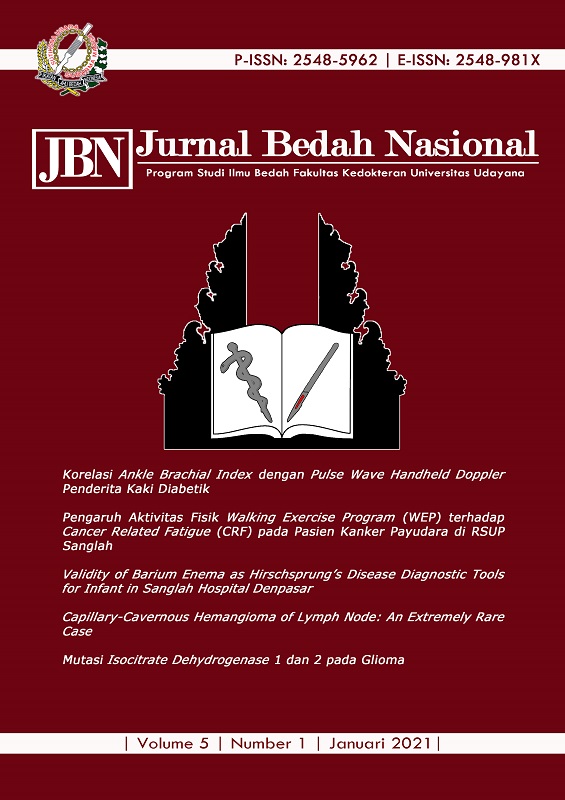Validity of Barium Enema as Hirschsprung’s Disease Diagnostic Tools for Infant in Sanglah Hospital Denpasar
Abstract
Aim: To determine the validity (sensitivity, specificity, likelihood ratio) of barium enema as Hirschsprung's disease diagnostic tool in infants. Methods: This study was a diagnostic test of barium enema compared with postoperative histopathology examinations as the gold standard. The population were all patients with indigestion symptom be discovered at the pediatric surgical clinic of Sanglah Hospital Denpasar. The sampling method was consecutive sampling, satisfy inclusion criteria (< 12 months old, indicate classic symptoms of Hirschsprung’s disease). The total sample of the study was 52 patients. Sensitivity, specificity, positive and negative predictive value were analysed using cross-tabulation test of barium enema and postoperative histopathology. Results: A total of 52 patients were evaluated during the study period, mean of age was 3.31 months old, and boys:girls (75%:25%). Based on symptoms, 98.08% of patients were delayed release of meconium more than 24-48 hours and abdominal distention. Among all the patients reviewed, sensitivity, specificity, positive and negative predictive value of barium enema for diagnostic of Hirschsprung’s disease was 95.5%, 87.5%, 97.7%, and 77.8%. Conclusion: Barium enema can be used as an early diagnostic tool for infants suspected of Hirschsprung’s disease.
Downloads
References
2. Yan Z, Poroyko V, Gu S, et al. Characterization of the intestinal microbiome of Hirschsprung’s disease with and without enterocolitis. Biochem Biophys Res Commun. 2014;445:269-74.
3. Esayias W, Hawaz Y, Dejene B, et al. Barium Enema with reference to rectal biopsy for the diagnosis and exclusion of Hirschsprung’s disease. East Cent Afr J surg. 2013;18:143-7.
4. Georgeson KE. Chapter 35: Hirschsprung’s Disease. In: Holcomb G, Murphy JP, editors. Ashcraft’s Pediatric Surgery. 5th Edition. Philadelphia: Elsevier; 2010. p.456-67.
5. Huang CC, Shih SL, Chen YF, et al. Hirschsprung Disease and Contrast Enema: Diagnostic Value of Simplified Contrast Enema and Twenty-Four-Hour-Delayed Abdominal Radiographs. J Radiol Sci. 2011;36:159-64.
6. Kessmann J. Hirschsprung’s disease: Diagnosis and Management. Am Fam Physician. 2006;74:1319-22.
7. Amiel J, Lyonnet S. Hirschsprung disease, associated syndromes, and genetics: a review. J Med Genet. 2001;38:729-39.
8. Moore SW, Tsifularo N, Nmadu PT, et al. Chapter 76: Hirschsprung’s Disease. In: Ameh EA, Bickler SW, Lakhoo K, et al, editors. Pediatric Surgery: A Comprehensive Text for Africa. Seattle: Global HELP; 2011. p.448-54.
9. Nurko S. Hirschsprung’s Disease. Motility Society [serial online] 2006 [cited 2015 November 29]. Available from: http://www.motilitysociety.org/pdf/Hirschsprung’s%20 disease%208.28a.2006.pdf
10. de Lorijn F, Kremer LCM, Reitsma JB, et al. Diagnostic Test in Hirschsprung’s Disease: A Systematic Review. J Pediatr Gastroenterol Nutr. 2006;42:496-505.
11. Abbas M, Rashid A, Laharwal AR, et al. Barium Enema in the Diagnosis of Hirschsprung’s Disease: A Comparison with Rectal Biopsy. Arch Clin Exp Surg. 2013;2:224-8.
12. Saravanan K, Kumaran V, Rajamani G, et al. Minimally invasive pediatric surgery: Our experience. J Indian Assoc Pediatr Surg. 2008;13:101-3.
13. O’Donovan AN, Habra G, Somers S, et al. Diagnosis of Hirschsprung’s Disease. AJR Am J Roentgenol. 1996;167:517-20.
14. Ishfaq M, Ahmad UF, Manzoor S. Hirschsprung Disease; Diagnosis and Management: Experience at Ibn-E-Siena and Nishtar Hospital, Multan. Professional Med J. 2014;21:20-6.
15. Wong AWY, Tsang DSF, Lam WWM. How Useful is Contrast Enema in the Diagnosis of Hirschsprung’s Disease? Five-year Experience from a Local Referral Centre. Hong Kong J Radiol. 2014;17:30-5.

This work is licensed under a Creative Commons Attribution 4.0 International License.
Program Studi Ilmu Bedah Fakultas Kedokteran Universitas Udayana. 
This work is licensed under a Creative Commons Attribution 4.0 International License.






